
Kirkuk is a city in Iraq, serving as the capital of the Kirkuk Governorate, located 238 kilometres north of Baghdad. The city is home to a diverse population of Kurds, Turkmens and Arabs. Kirkuk sits on the ruins of the original Kirkuk Citadel which sits near the Khasa River.
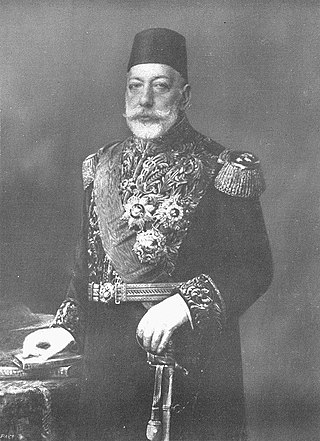
Mehmed V Reşâd was the penultimate sultan of the Ottoman Empire from 1909 to 1918. Mehmed V reigned as a constitutional monarch, interfering little when it came to government affairs, though the constitution was held with little regard by his ministries. The first half of his reign was marked by contentious politicking between factions of the Young Turks, and the second half by war and domination of the Committee of Union and Progress and the Three Pashas.

Muhammad Naji Shawkat Bey was an Iraqi politician who served as the prime minister of Iraq under King Faisal I.

Naim bey Frashëri, more commonly Naim Frashëri, was an Albanian historian, journalist, poet, rilindas and translator who was proclaimed as the national poet of Albania. He is regarded as a pioneer of modern Albanian literature and one of the most influential Albanian cultural icons of the 19th century.

Mustafa Kemal Atatürk, or Mustafa Kemal Pasha until 1921, and Ghazi Mustafa Kemal from 1921 until 1934, was a Turkish field marshal, revolutionary statesman, author, and the founding father of the Republic of Turkey, serving as its first president from 1923 until his death in 1938. He undertook sweeping progressive reforms, which modernized Turkey into a secular, industrializing nation. Ideologically a secularist and nationalist, his policies and socio-political theories became known as Kemalism. Due to his military and political accomplishments, Atatürk is regarded as one of the most important political leaders of the 20th century.
A kaza is an administrative division historically used in the Ottoman Empire and is currently used in several of its successor states. The term is from Ottoman Turkish and means 'jurisdiction'; it is often translated 'district', 'sub-district', or 'juridical district'.

Sheikh Riza Talabani was a celebrated Kurdish poet from Kirkuk, Iraq. Talabani wrote his poetry in Kurdish, Persian, and Arabic. Most of his poetry consists of Satire, Ribaldry, Flyting and creative insults.
Hattat Aziz Efendi was an Ottoman calligrapher.
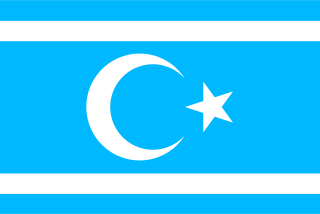
The Iraqi Turkmen, also referred to as Iraqi Turks, Turkish-Iraqis, the Turkish minority in Iraq, and the Iraqi-Turkish minority are Iraq's third largest ethnic group.

Al-Waqa'i' al-Misriyya was an Egyptian newspaper established in 1828 on the order of Muhammad Ali, originally called "Vekayi-i Misriye" and written in Ottoman Turkish in one column with an Arabic translation in a second column, and later in Arabic only under the Arabic title.

Sami bey Frashëri or Şemseddin Sâmi was an Ottoman Albanian writer, philosopher, playwright and a prominent figure of the Rilindja Kombëtare, the National Renaissance movement of Albania, together with his two brothers Abdyl and Naim. He also supported Turkish nationalism against its Ottoman counterpart, along with secularism against theocracy.
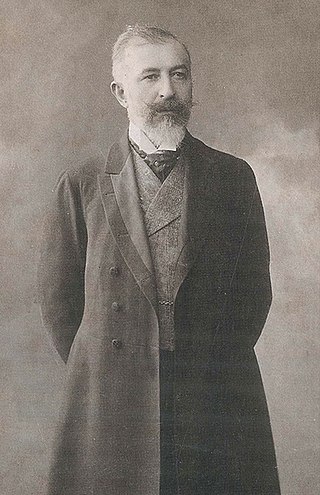
Halid Ziya Uşaklıgil was a Turkish author, poet, and playwright. A part of the Edebiyat-ı Cedide movement of the late Ottoman Empire, he was the founder of and contributor to many literary movements and institutions, including his flagship Servet-i Fünun journal. He was a strong critic of the Sultan Abdul Hamid II, which led to the censorship of much of his work by the Ottoman government. His many novels, plays, short stories, and essays include his 1899 romance novel Aşk-ı Memnu, which has been adapted into an internationally successful television series of the same name.

Prince Mustafa Al-Shihabi was a Syrian agronomist, politician, writer and the third elected director of Arab Academy of Damascus (1959–1968).
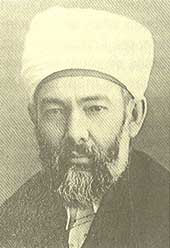
Muhammed Hamdi Yazır also known as Elmalılı Hamdi Yazır and Elmalılı was a Turkish Maturidi theologian, logician, Qur'an translator, Qur'anic exegesis scholar, Islamic legal academic, philosopher and encyclopedist.
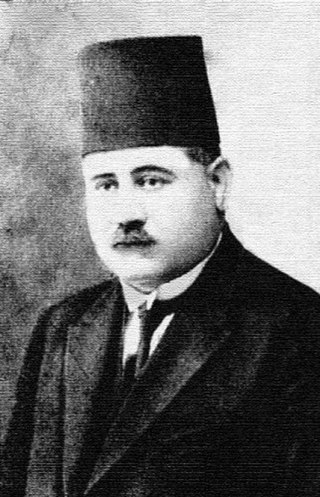
Rida Said al-Aytouni, was a Syrian eye surgeon and ophthalmologist and the leading educational reformer of Syria in the early 20th century. After World War I he reinstated the Arab Medical School in Damascus, becoming its first Dean and linking it to the National Hospital. Under the French mandate, Said founded the Syrian University in 1923, becoming its first President.

İbrahim Şinasi was a pioneering Ottoman intellectual, founder of Turkish dramaturgy, author, journalist, translator, playwright, linguist and newspaper editor. He was the innovator of several fields: he wrote one of the earliest examples of an Ottoman play, he encouraged the trend of translating poetry from French into Turkish, he simplified the script used for writing the Ottoman Turkish language, and he was one of the first of the Ottoman writers to write specifically for the broader public. Şinasi used his newspapers, Tercüman-ı Ahvâl and Tasvîr-i Efkâr, to promote the proliferation of European Enlightenment ideals during the Tanzimat period, and he made the education of the literate Ottoman public his personal vocation. Though many of Şinasi's projects were incomplete at the time of his death, "he was at the forefront of a number of fields and put his stamp on the development of each field so long as it contained unsolved problems."

Mirza Habib Esfahani was an Iranian poet, grammarian and translator, who lived in exile in the Ottoman Empire for much of his life. He is principally known for his Persian translation of the satirical novel The adventures of Hajji Baba of Ispahan and for composing the first systematic grammar of the Persian language.
Selim Bayraktar is an Iraqi-Turkish actor best known for his role as "Sümbül Ağa" in Muhteşem Yüzyıl. He received international recognition with his role in the Netflix original series Rise of Empires: Ottoman.

Ma'ruf bin Abdul Ghani al Rusafi (1875–1945) was a poet, educationist and literary scholar from Iraq. He is considered by many as a controversial figure in modern Iraqi literature due to his advocacy of freedom and opposition to imperialism and is known as a poet of freedom.
Mohammed Sadiq Hassan 'Awni Effendi was an Iraqi polyglot poet and writer. Born in Kirkuk to a Turkmen-Arab family, he studied and learned Arabic, Persian, Turkish and Kurdish. Joined the Military Academy in Istanbul and graduated with the rank of second lieutenant, then was appointed to the Ottoman army and contributed to wars, such as Siege of Kut and World War I. After war, appointed in education and left the army to work in the teaching of religious Islamic sciences at the Khangah Mosque. He wrote poetry in Turkish, Persian, and Arabic, but was his best poets written in Turkish. He published his poetry in Iraqi newspapers and other local newspapers in Kirkuk, his hometown. Some of his printed books are The World War Memories (1925), My Reflections (1956) and The Passionate Sensations (1964), many of his poems were translated into Arabic. He died in Husam al-Din Mosque in central Kirkuk.















